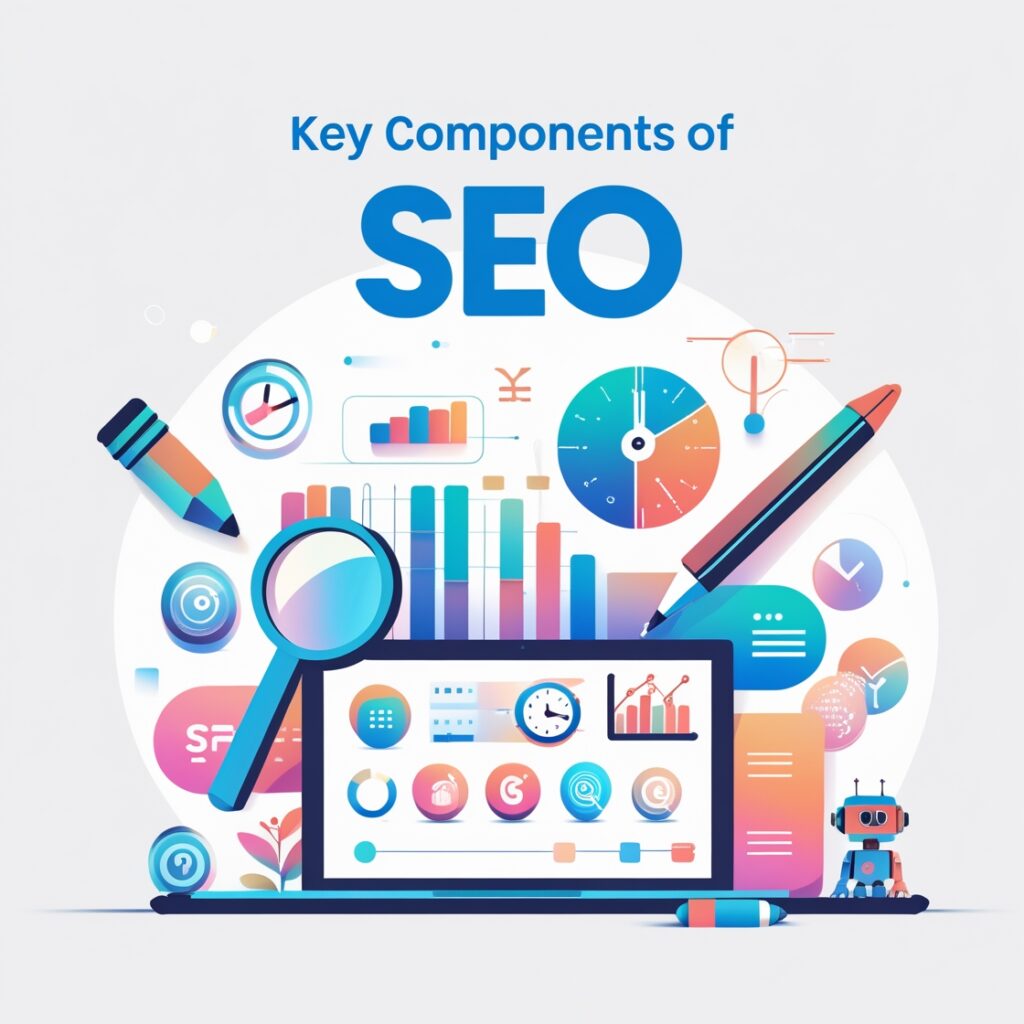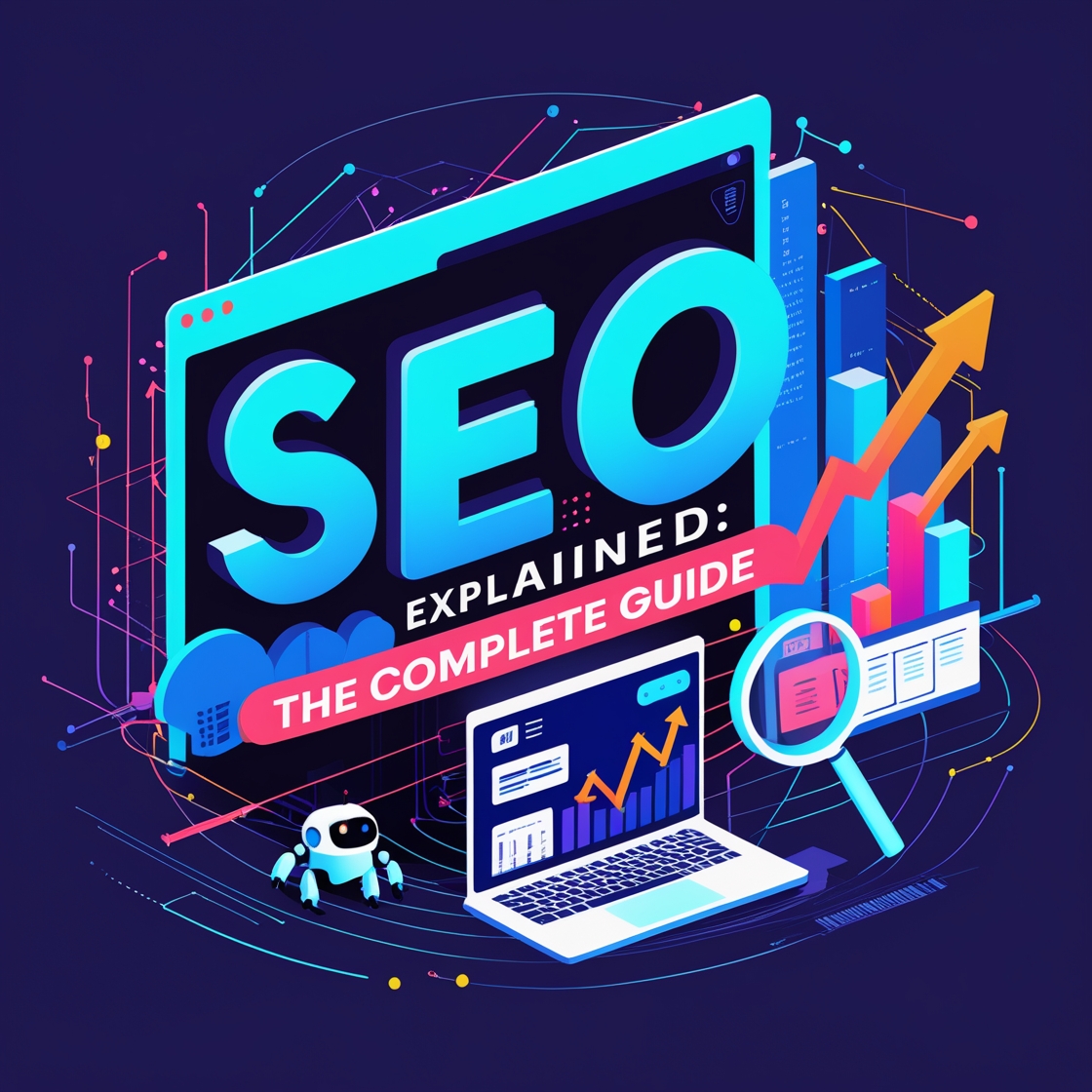In today’s digital-first world, Search Engine Optimization (SEO) is no longer optional—it’s essential. Whether you’re a small business owner, a marketer, or a blogger, understanding SEO can make or break your online presence. This comprehensive guide will walk you through everything you need to know about SEO, from the basics to advanced strategies, to help you rank higher on Google and drive more organic traffic to your website.
What is SEO?
Search Engine Optimization (SEO) is the process of optimizing your website to improve its visibility on search engines like Google, Bing, and Yahoo. When your site ranks higher in search engine results pages (SERPs), it attracts more organic (non-paid) traffic, which can lead to increased brand awareness, leads, and sales.
SEO is divided into three main categories:
On-Page SEO: Optimizing individual pages on your website.
Off-Page SEO: Building authority through external links and social signals.
Technical SEO: Ensuring your website is technically sound for search engines to crawl and index.
By mastering these three pillars, you can create a strong foundation for your website’s success.
Why SEO is Important for Your Website
SEO is the backbone of any successful digital marketing strategy. Here’s why:
Higher Rankings: SEO helps your website rank higher on Google, making it more visible to potential customers.
Increased Organic Traffic: Ranking on the first page of Google can significantly boost your website traffic without the need for paid ads.
Credibility and Trust: Websites that rank high are often perceived as more trustworthy by users.
Cost-Effective: Unlike PPC (Pay-Per-Click) advertising, SEO focuses on organic traffic, which is free and sustainable in the long run.
While PPC can deliver quick results, SEO builds lasting value for your website. If you’re looking for a balanced approach, consider combining SEO with PPC services for maximum impact.
Key Components of SEO

A. On-Page SEO
On-page SEO focuses on optimizing individual pages to rank higher and attract more relevant traffic. Key elements include:
Title Tags: Write compelling and keyword-rich titles (under 60 characters).
Meta Descriptions: Summarize your page content in 150-160 characters to entice clicks.
Header Tags (H1, H2, H3): Use headers to structure your content and improve readability.
Keyword Placement: Include your primary keyword naturally in the first 100 words, subheadings, and throughout the content.
Internal Linking: Link to other relevant pages on your website to improve navigation and SEO. For example, if you offer website design services, link to that page when discussing user experience.
Image Optimization: Compress images and use descriptive alt text to improve load times and accessibility.
B. Off-Page SEO
Off-page SEO involves activities outside your website to improve its authority and rankings. Key strategies include:
Backlinks: Earn high-quality backlinks from reputable websites to boost your domain authority.
Guest Posting: Write articles for other websites to gain exposure and backlinks.
Social Signals: Engage with your audience on social media to drive traffic and improve brand visibility.
C. Technical SEO
Technical SEO ensures your website is easy to crawl and index. Key factors include:
Website Speed: Optimize load times to improve user experience and rankings.
Mobile-Friendliness: Ensure your site is responsive and works seamlessly on all devices.
HTTPS Security: Use SSL certificates to secure your website.
Schema Markup: Add structured data to help search engines understand your content better.
D. Local SEO
For businesses targeting a local audience, Local SEO is crucial. Key tactics include:
Google My Business: Optimize your GMB profile with accurate information, photos, and reviews.
Local Citations: Ensure your business name, address, and phone number (NAP) are consistent across directories.
Reviews: Encourage satisfied customers to leave positive reviews on Google and other platforms.
How to Do Keyword Research
Keyword research is the foundation of any successful SEO strategy. Here’s how to do it:
Use Keyword Research Tools: Tools like Google Keyword Planner, Ahrefs, and SEMrush can help you find relevant keywords.
Analyze Competitors: Identify keywords your competitors are ranking for and find gaps in their strategies.
Focus on Long-Tail Keywords: These are longer, more specific phrases that have lower competition and higher conversion rates.
Check Search Intent: Ensure the keywords you target align with what users are searching for.
SEO Best Practices for 2025
SEO is constantly evolving. Here are the top trends to watch in 2025:
Voice Search Optimization: Optimize for conversational queries as voice search continues to grow.
AI and Machine Learning: Leverage AI tools to analyze data and predict search trends.
Core Web Vitals: Focus on user experience metrics like loading, interactivity, and visual stability.
E-E-A-T (Experience, Expertise, Authority, Trustworthiness): Build your website’s credibility by creating high-quality, authoritative content.
Common SEO Mistakes to Avoid
Even small mistakes can hurt your SEO efforts. Avoid these pitfalls:
Keyword Stuffing: Overloading your content with keywords can lead to penalties.
Ignoring Mobile Optimization: With most users on mobile, a non-responsive site can kill your rankings.
Buying Backlinks: Purchasing low-quality backlinks can result in Google penalties.
Neglecting Analytics: Regularly monitor your SEO performance using tools like Google Analytics and Search Console.
Advanced SEO Strategies

1. Content Clusters and Topic Clusters
Content clusters are groups of interlinked content that cover a broad topic in-depth. For example, if your main topic is “SEO,” you can create subtopics like “On-Page SEO,” “Off-Page SEO,” and “Technical SEO.” This strategy helps search engines understand your content better and improves your chances of ranking for multiple keywords.
2. User Experience (UX) Optimization
Google prioritizes websites that offer a great user experience. Focus on:
Navigation: Make it easy for users to find what they’re looking for.
Readability: Use short paragraphs, bullet points, and headings to break up text.
Engagement: Add interactive elements like videos, quizzes, and infographics to keep users engaged.
3. International SEO
If your business targets a global audience, International SEO is a must. Key steps include:
Hreflang Tags: Use these tags to indicate the language and region of your content.
Country-Specific Domains: Use ccTLDs (country code top-level domains) like .uk or .ca for better local rankings.
Localized Content: Create content that resonates with your target audience’s culture and language.
4. Video SEO
Video content is becoming increasingly popular. Optimize your videos for SEO by:
Using Keywords: Include keywords in your video titles, descriptions, and tags.
Adding Transcripts: Provide transcripts to make your videos accessible and indexable.
Hosting on Your Website: Embed videos on your site to keep users engaged and reduce bounce rates.
SEO Tools You Need in 2025
To stay ahead in SEO, you need the right tools. Here are some must-haves:
Google Analytics: Track your website’s performance and user behavior.
Ahrefs: Analyze backlinks, keywords, and competitors.
SEMrush: Conduct keyword research and track rankings.
Screaming Frog: Audit your website for technical SEO issues.
Yoast SEO: Optimize your WordPress site for on-page SEO.
Conclusion
SEO is a powerful tool that can transform your online presence and drive sustainable growth for your business. By focusing on on-page SEO, off-page SEO, and technical SEO, you can improve your rankings, attract more organic traffic, and stay ahead of the competition.
Ready to take your SEO to the next level? Partner with a professional SEO services provider “Top in SERP” to achieve your goals faster and more effectively. Start optimizing your website today and watch your rankings soar!


